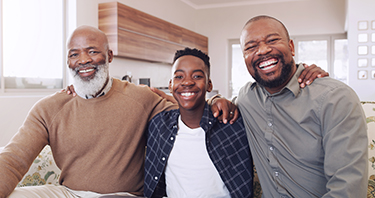This year's Men’s Health Month theme is closing the “empathy gap." The term refers to the gap in funding and support for men’s health issues, according to the Men’s Health Network.
For Black men in the U.S., the gap can seem wide. Research shows that racism and discrimination impacts the quality of the care Black men receive from health providers. Black men can also suffer from chronic mental and physical challenges due to discrimination, social injustice, cultural biases and other factors.
Caleb Wiggins, an intern for APHA’s Center for Public Health Policy, spoke to Mighty Fine, MPH, APHA’s associate executive director of policy and practice, about the health challenges faced by Black men and the opportunities for closing the empathy gap.
Men’s mental and physical health is often overlooked, leading to fewer resources, delayed care and limited awareness, according to advocates. What are the top health concerns Black men face?
There’s this ideology of needing to be a strong man — conflating strength with masculinity —which sometimes discourages addressing mental health. While progress has been made, stigma around seeking mental health support remains a barrier for some Black men.
We're carrying generations of trauma coupled with a cultural pressure to be strong and withstand it all. We often talk about resilience, which is a good thing, because we want to be able to stand through the storm. However, I think when we overly rely on people being able to weather through the storm, we forget about the support, the care and love that we need to even foster resilience within us.
Because of all that, depression, anxiety and suicidal ideation are experienced by Black men, but are often unaddressed. Breaking the silence and helping Black men understand that support exists and it's OK to get help is key to changing that narrative.
Another top health concern for Black men is violence. It’s one of the leading causes of death for young Black men — and it’s preventable. In calling this issue out, I want to also acknowledge and debunk the myth that Black men have a proclivity for violence — that’s not true. But we do know violence is proximal. To prevent it, it’s important that we address the social and contextual factors that exacerbate the likelihood of violence, whether we’re talking about perpetration or victimization.
How can the public health community create and build empathy-driven solutions to improve the health of Black men?
I’ve seen firsthand how structural inequities, mistrust and systemic racism shape the health outcomes of Black men. To create empathy-driven solutions, we need to center the lived experiences of Black men. We shouldn’t be treated as a number or subjects to be studied, but as partners in the work. That begins with listening
We must create spaces where Black men can speak openly about their health, whether physical, mental or emotional.
We also must shift the narrative about Black men. We are too often framed through deficits like violence or incarceration, without recognizing the full spectrum of who we are: fathers, sons, husbands, partners, leaders and survivors. Empathy-driven public health solutions must affirm our humanity, restore our dignity and confront the policies and practices that have historically denied us both. This is what we need for transformation of not just health outcomes but our lives overall.
As a Black man working in public health, how do you bridge your professional training with your lived experience?
I grew up in Brooklyn, New York, in an urban environment and witnessed the social determinants of health at play long before I knew how to describe them. Later, I moved to a rural part of Pennsylvania and saw many of the same issues, just in a different context. It helped me understand how your ZIP code can be more predictive of your health than your genetic code. I quickly recognized how your environment matters.
So, as a trained social epidemiologist, I'm able to carry my community on my back when I come into public health spaces and advocate for the support and services that I know Black men need.
My lived experience gives me insight into the nuances that textbooks and theoretical models don’t always account for: racial microaggressions in health care, how generational trauma shapes health behaviors, the unspoken stigma around seeking mental health care. I draw from all of this to inform how I interpret data, how I approach prevention strategies and how I foster relationships.
What advice would you share with Black men?
Going to the doctor isn’t weakness — it’s strength. I suggest learning your family’s health history as well. Take your health seriously so others will too. When you take ownership of it, you empower yourself as an advocate for your overall well-being.
I would also say treat your health care provider like your barber. If your barber messes up your haircut, you don’t go back or you say something to him about fixing it. Same with health care — if a provider isn’t meeting your needs, you let them know or find someone else. You have that right and don’t be afraid to exercise it.
Another piece of advice I would give Black men is to vote with your health in mind. Local elections shape the policies that affect your access to health care, safe communities and healthy environments. School boards, sheriffs, judges all play a role in shaping community access and outcomes. We have to raise our voices to demand change at the system level — calling out racism, neglect and community disinvestment that continues to harm us.
Black men are more than a statistic. We are fathers, sons, brothers, husbands, partners, confidants, innovators and so much more. We deserve to live long, fulfilled, healthy lives.
Caleb Wiggins is studying health education at Morgan State University. This interview was edited for length and clarity.
Photo by Shapecharge, courtesy iStockphoto